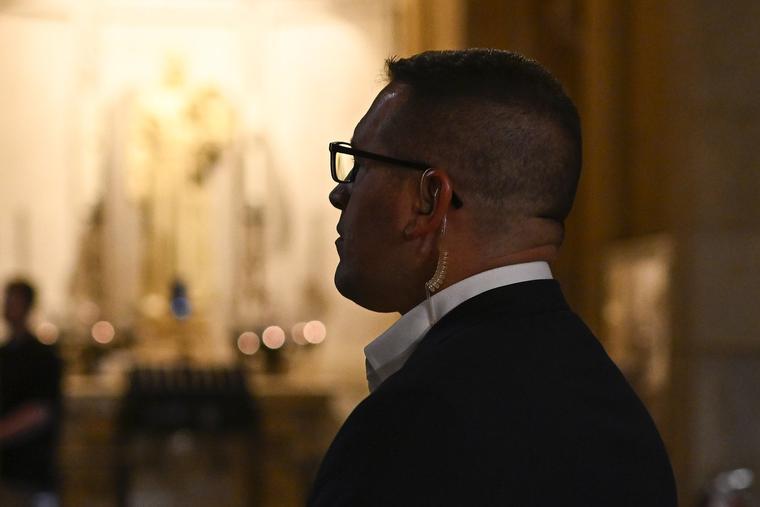By Jonah McKeown
Copyright ncregister

As concerns over political violence continue to simmer in the wake of the Aug. 27 Annunciation school shooting, Catholic schools and parishes throughout the nation are actively reevaluating their security protocols — hiring professional security teams, enlisting volunteers, and doing long-overdue technological upgrades — with many wondering where the funds for these upgrades will come from.
In California, a program instituted only a couple of years ago and boosted by the state Catholic conference has already pumped hundreds of thousands of dollars into the state’s Catholic schools for security improvements.
Crucially, California lawmakers of various faith backgrounds worked together to amend the program’s eligibility requirements to ensure that Catholic entities can make full use of the state’s funds without encountering problematic strings.
The Context
As previously reported in the Register’s pages, there is a federal program called the Nonprofit Security Grant Program (NSGP), administered by FEMA, that gives grants every year to nonprofits — including many religious nonprofits — to fund the installation of security cameras, the building of fences, strengthening of windows and the hiring of security guards, among other things.
Of the $275-million funds available for fiscal year 2025, about half is allocated to nonprofits in urban areas deemed high-risk for extremist attacks, while the other half is allocated to nonprofits elsewhere. Numerous Catholic dioceses, schools and charities have received federal NSGP grants in the past, the U.S. bishops say.
Additionally, nearly half of U.S. states make additional security funds available to nonprofits to supplement the federal program. Many of those states model their programs off the federal one, adopting nearly identical requirements for applicants.
FEMA’s terms and conditions say that recipients of the security grants must adhere to federal antidiscrimination laws. Because of issues under previous administrations with the Catholic view of gender and sexuality clashing with new interpretations of those laws, many Catholic parishes and schools have historically been wary of applying for these grants.
‘A Really Good Outcome’
During the 2019 legislative session, California lawmakers passed A.B. 1548, which created the California State Nonprofit Security Grant Program (CSNSGP). Administered by the California Governor’s Office of Emergency Services (Cal OES), the CSNSGP awards funding to at-risk nonprofit organizations, including churches, to enhance their physical and cybersecurity.
The state grants can be used for security measures such as reinforced doors, gates, high-intensity lighting, access control systems, and the development and enhancement of security plans and protocols.
In March, California announced a grant fund of $76 million for 2025 — nearly double the amount allocated in previous years — under the CSNSGP. Democratic Gov. Gavin Newsom’s office says more than 1,600 organizations applied for the CSNSGP during this year’s round of funding, totaling more than $325 million in requested support.
The grants have delivered significant security upgrades for Catholic schools in California, with many schools and parishes receiving the maximum $200,000 grant the first year they apply.
Kathleen Domingo, executive director of the California Catholic Conference (CCC), which advocates policy on behalf of the state’s bishops, told the Register that California’s nonprofit security grant program was modeled on the federal program and the effort to create it was led by Assemblymember Jesse Gabriel, D-Encino, and the California Legislative Jewish Caucus.
Some of the biggest boosters of state-level nonprofit security grant programs — especially after a rash of antisemitic violence in recent years — have been national Jewish organizations, such as Jewish Federations of North America and the Jewish Council for Public Affairs (JCPA), along with numerous state-level Jewish groups. In California, the CCC worked closely with the Jewish Caucus to support the creation of the state nonprofit security program.
“It was really helpful to have the partnership with the Jewish Caucus that we had established over many years of supporting bills together to really be able to say, ‘Look, we’re all in this together. This is a religious-liberty issue. We want to support each other’s different viewpoints here.’ It was a really good relationship and a really good outcome,” Domingo said.
The coalition was successful in getting the program created, she said, but Catholic entities initially couldn’t access the funds due to “standard assurances” — conditions that come with the receipt of government funding — tied to employment laws, such as California’s Fair Employment and Housing Act (FEHA), that conflict with religious hiring exemptions.
Working with California’s Office of Emergency Services and Gabriel’s office, Domingo said they have since been able to unlock access for Catholic institutions by amending the standard assurances to include the qualifier “as applicable”; meaning Catholic nonprofits, — which are exempt from aspects of FEHA — are not bound by FEHA if they accept the state grants.
“Where the law is applicable, we agree that it should be applied. It’s not applicable to us, so we are exempt. And that was it,” Domingo explained.
Domingo said California has shared its amended assurances and coalition strategy with other states, urging Catholics to partner with other groups, such as Jewish organizations, to work to broaden access to the security grants.
Of course, no government program is entirely without its downsides, and Domingo said she understands that some Catholic entities may still be wary. In accepting public funds, there’s always a worry, founded or not, “that the government may come and say, ‘Okay, you’ve taken our money, and now we need something from you.’”
“I don’t want to sugarcoat it and say, this is just free money … but for the vast majority of our schools and parishes, this has been a real blessing,” Domingo said.
‘No Strings Attached’
Dozens of parishes and schools across the Golden State have received thousands of dollars from the CSNSGP to up their security game in recent years.
St. Rose Catholic School in Paso Robles in central California, for example, used the grant money to install a schoolwide camera system, with 40 cameras throughout the campus and two televisions inside of the front office that are mounted to the wall to monitor the feeds. St. Rose also now has Level 2 bullet-resistant glass installed on its front four classrooms that face the parking lot and street area, with plans to install the same glass on the back side of the school and the front office.
Rocky Domingo, Kathleen’s husband and principal at Holy Spirit Parish School in Sacramento, told the Register that it has been a blessing to the school community to be able to receive money with “no strings attached to it” to help the school creatively act on security concerns that the staff had long recognized.
Holy Spirit applied for and received a $200,000 grant from Cal OES in 2023, one of 16 Diocese of Sacramento Catholic entities to receive such a grant that year. With the grant money, Holy Spirit School has since been able to realize a laundry list of safety improvements.
“Our mission is to nurture children in faith and knowledge, and parents trust us to do so in a safe environment. Yet with limited budgets, meaningful security improvements are often out of reach. The grant allowed us not only to move forward with upgrades we had identified but also to do so in ways that were creative and thoughtful,” Domingo said.
Domingo said the Holy Spirit community has been very thankful for the security enhancements. In the grant application, which Domingo shared with the Register, the school noted that there have been “vandalism, theft and trespassing” incidents at the school, as well as gang activity and political protests in the surrounding area.
Reinforced steel doors can now be found in every classroom in the school; they upgraded the bell and PA systems and added an additional dozen security cameras throughout the campus, as well as a camera intercom system at the front gate, Domingo continued.
Chief among the upgrades has been a complete reconfiguring of the school’s front office. Before the redesign, visitors to the school were “buzzed in” through one of the school’s two main gates, but then they could go wherever they wanted because they weren’t funneled directly through the front office. The reconfiguration makes a stop at the front desk mandatory for all visitors.
In addition, access to the school for teachers and staff is very different than it was before. Previously, entry to the campus could be obtained by anyone who had the front-gate code — which, after years of being given out to anyone who needed it, was hardly a secret.
Now, the school’s doors operate entirely through a secure key-card system, which can be easily tracked, locked down, and narrowly tailored to suit the access needs of the cardholder. For example, the system allows the school to give coaches access to the gym at certain hours, and catechists to certain classrooms at certain hours, enhancing flexibility while ensuring access to the school remains tight.
Applying for the grant involved doing a threat analysis for the school, using police data to look at crime statistics within a 3-mile radius. Domingo said they tried to “do their homework” to make sure the grant was appropriate for them and ensure they weren’t taking grant money from other, more deserving schools.
Domingo said that while the application and implementation process was smooth, there were a few unexpected points to consider for other schools wanting to apply for the grant. Firstly, because the nonprofit security grant awards in California are public, security-system vendors approached the school after it won the grant, aware there was money to spend. Domingo urged every school to do thorough research to make sure they choose the best systems and vendors for their needs.
In addition, schools that apply for the grant need to be aware that they will be financially responsible for the ongoing maintenance and upkeep of whatever security systems they are able to obtain, even if the cost of installation is covered. And the way the grant works, he noted, is that the school must pay to do the upgrades first, and then the state reimburses the school — meaning the school likely needs enough capital in hand to temporarily cover the costs, before getting reimbursed.
“We didn’t actually get the money until we spent money,” Domingo said.
Even if a school goes through the application process but doesn’t win the state grant, Domingo noted, it’s helpful for schools to assess their security needs and have a plan in place; you might not get the big state grant, but what if a donor comes in offering a few thousand dollars? Having a security plan already drawn up makes it easier to sell it to the state, benefactors and parents, he said.
Kathleen Domingo urged policymakers at the federal level, and in other states, to work to adjust NSGP requirements so that Catholic nonprofits can fully access security funds, especially considering recent school violence.
“Unfortunately, we [the CCC] don’t have a ton of influence with our state Legislature, but the Jewish Caucus did, and we’ve been friends. We were able to work with them to really help them understand what was prohibiting us from using the grant,” Domingo said.
“I would tell other states, too, if you yourself have a loud enough voice in your state legislature to carry a bill like this or to have your Office of Emergency Services understand this, that’s great. But if not, find some other partners, find some other nonprofit organizations or some other faith-based organizations that might have a larger voice. Maybe together you can build a coalition and have a large voice and say, ‘This is what we need to have done.’”



